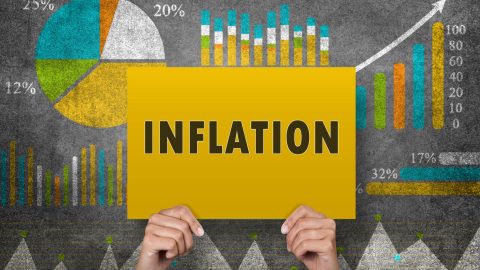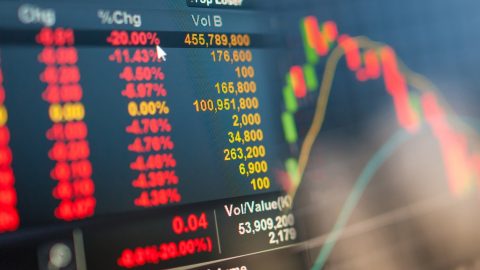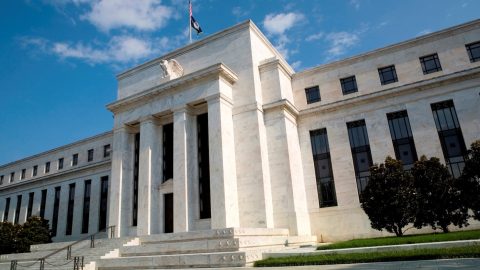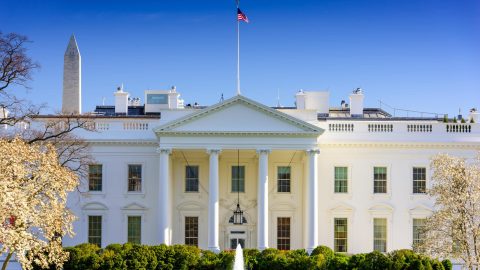All articles on the topic “Markets”
How does inflation work? – Part 2: Inflation drivers
There are many factors that may affect inflation. Also, the weights of certain factors may vary across countries. Take the development of the exchange rate, for example.
Inflation worries burdening stock exchanges – part 2: the macro perspective
Equity indices have undergone a global correction in the past days. The Dow Jones index has shed more than 10% from its January high. What is the macro-economic reason for the correction?
Strong growth and rising rates
At the beginning of 2018, economic indicators are confirming the recovery scenario. Above all, the yields of government bonds are on the rise. Why is that the case, and what does it mean for the financial market as a whole?
Inflation: a general overview – Part 1
At the moment the environment on the markets is very supportive. The economy is booming, the big central banks are still buying government bonds on aggregate and are thus keeping yields low, and the tax reform in the USA has improved the sentiment further over the past weeks. In addition, most asset managers agree on the status quo. Given this background, people ask “when will the party end?”. An increase in inflation is (one of) the usual suspect(s).
Czech Presidential Election and the reaction of the markets
With both rounds of the Czech presidential election behind us, we can now take a look back at some of its highlights. Incumbent Milos Zeman reaped a narrow edge over his challenger Jiri Drahos.

Interview: “Future 2050 – the era of sustainability and smart machines”
Interview with Ulrich Eberl, one of the most renowned German-speaking scientific journalists and futurologists. Among the books he has published are “Zukunft 2050 – wie wir schon heute die Zukunft erfinden“ (“Future 2050 – how we are inventing the future today”) and “Smarte Maschinen – wie Künstliche Intelligenz unser Leben verändert“ (“Smart machines – how artificial intelligence changes our lives”).
Bitcoin Basics
Bitcoins were developed in 2009 as a virtual, digital currency by one person or group with the pseudonym Satoshi Nakamoto. Bitcoins are not physically tangible and are thus also difficult to grasp mentally for many.
Ten economic hypotheses for 2018
The current environment is very positive for the capital markets: strong growth, low inflation, supportive monetary policies, good earnings growth, and low volatilities, i.e. fluctuations. Also, the numerous risks have not had a significantly negative impact on prices. However, the phase of rising prices started as early as March 2009.
Best of Erste AM Investment Blog 2017
2017 was a positive year on the global capital markets. We have analysed which blogs were the most popular ones last year.
2017: a positive year on the global capital markets
Capital markets recorded a positive year of 2017. The performance of the various asset classes was of the textbook variety: the higher the risk, the higher the return.
Market Monitor: risky markets have come far
Earlier this week, we convened the last Investment Committee of 2017. The general risk appetite of the team has not changed vis-à-vis the previous month (from 78.85 percent to 79 percent on our 0 – 100 percent scale). The team continues to see the future optimistically, with a resulting “risk on” stance.
Capital markets outlook for 2018: Will the party hold on?
2017 is drawing to an end, and the bottom line is positive. The outcome is significantly better than we had expected. Since the financial crisis in 2008, the global economy has never expanded more quickly and especially concertedly than in 2017. Also, inflation has surprised on the downside, falling short yet again of the expectations held by central banks and analysts.
Xi Jinping’s New Era
Certainly, the National Congress of the Communist Party of China held every five years in Beijing is an important political event, but this year’s Party Congress was a milestone. It marked that a new era has begun in China. President Xi Jinping cemented his power further as China’s paramount leader, a leader, who might rule the country on the coming decade, a leader, who has high ambitions.
Emerging markets – not a pure commodities story any longer
The global economy is experiencing significant growth, and the emerging markets have felt the increased economic growth rates as well. Even in problematic countries such as Brazil or Russia, the situation has been picking up due to the increased oil price.
China on the way to new strength
Driving through Beijing you will see megalomania without limits – in houses, traffic, and people. A trip in a tuk-tuk, which looks like a motorcycle on three wheels, allows you a short glance into the past. It is at these moments that the rift between rich and poor becomes obvious.
Hyperinflation in Venezuela
Venezuela is in a difficult situation. Hyperinflation describes the economic environment best. For 2017, the IMF estimates a consumer price inflation of 650% y/y, and for 2018, the estimate is 2,300%.
Market Monitor: Optimism on the rise
This week we held our monthly Investment Committee meeting. Although only little has changed with regard to the overall economic picture, we were having a few interesting discussions that we would now like to share with you.
An impressive stunt
The Council of the European Central Bank pulled an impressive stunt at the monetary policy meeting on 26 October. ECB President Mario Draghi announced to reduce the extremely supportive monetary policy in the near future while …

IMF-meetings in Washington: positive outlook for emerging markets
The following points reflect my impressions at the presentations that I attended at the IMF-meetings in Washington from 12 to 15 October 2017.
Disruption from Catalonia
The events in Catalonia are a new disruptive political element on the capital markets. The basic question is whether the generally favourable environment for risky assets is sustainable.
Renmimbi – a managed currency
Long enough we have heard about the depreciation of Chinese currency Renmimbi (RMB), but this year RMB has showed rather unusual movements.
Market Monitor: positive for risky asset classes
Once a month the Investment Committee of Erste Asset Management convenes in order to discuss the medium-term market outlook. We are going to start a new blog, where we will report on what drives our investment professionals and what risks they see.
Urbanisation in Asia: challenge and opportunity
Asia’s cities are growing and growing, presenting the urban infrastructure with great challenges. Thanks to technical progress, the relevance of environmentally friendly transport solutions is on the rise. Investors can benefit from this trend, as Gabriela Tinti points out in an op-ed article for the magazine “Global Investor”.
US central bank will start reducing bond holdings in October
The most important central bank in the world, the Federal Reserve of the USA, has announced a historic decision as a result of its FOMC meeting on 20 September: the central bank balance sheet, hugely inflated in the wake of the bond purchase programme, will be gradually reduced from October onwards. Generally speaking this is […]
Economic scenarios 2018
Q3 is drawing to its end. Traditionally, this heralds the development of a strategy for the next year, an important part of which is the creation of scenarios. On the basis of the status quo, we have drawn up three further different scenarios in this blog entry.
US debt ceiling keeping the financial markets on their toes
The Trump administration should be keeping the financial markets on their toes in the coming weeks. Yet again, the issue is the government debt which will soon reach its statutory maximum.
Growth picking up in the emerging economies
Economic growth has increased significantly on a global scale and is broadly supported. According to our preliminary estimate, global GDP recorded a growth rate of 3.7% from Q1 to Q2 (annualised). While the developed economies have presumably grown by 2.7%, the emerging economies posted a growth rate of 5.2%. In this article, we would like to take a closer look at the emerging markets on the basis of classic economic indicators.
Solid Growth
Some ten years after the outbreak of the Great Recession, global economic growth is positive and broadly based, inflation is low in the developed economies and falling in important emerging economies, and monetary policies are very supportive, cautious, and predictable. At the same time, company earnings growth has increased significantly, and the volatilities of many asset prices are low. This environment is generally positive for risky asset classes.
Quo Vadis, Federal Reserve? – Part 3
I will be upfront about it: to me, the Taylor rule is still a helpful tool to assess the future monetary policy of the US central bank. However, it should not be used as blueprint without thinking it through. Instead, it should be seen as heuristic tool that helps structure one’s analysis.
Quo Vadis, Federal Reserve? – Part 2
Since 2008, the key-lending rates in the USA seem to have been significantly too low as measured by the Taylor rule. With some economists blaming Alan Greenspan’s loose monetary policy as partially responsible for the financial crisis of 2008, the question is whether we are in for a déjà-vu.
Style management in practice: part 2
Having defined and explained various management styles in equity management in part 1, we will now have a look at the specific styles and their return/risk ratio over time.
Quo Vadis, Federal Reserve? – Part 1
The US central bank has embarked on a cycle of interest rate hikes. The question is: by how much will the interest rates increase still, and at what point will it reach a level detrimental to the economy, where equities should be regrouped into asset classes less sensitive to the economic cycle?
Style management in practice: part 1
A clear sense of style is not only important in fashion, but more and more so in equity management as well. But what does “style” mean in equity management? Do stylistic preferences change over time, like in fashion? If so, what triggers those changes? Questions upon questions, but before we go into detail in part 2 of this series, let us first clarify what we mean by style(s).
Which factors drive equity markets?
It is almost impossible to speak with fund managers and not address the economy or monetary policy. Why is that so? This blog entry will try to answer the question on the basis of data from the US equity market from 1950 onwards.
Monetary policy of central banks is tightening up
Volatility has increased on the markets. The main reason for this has not occurred often in the past years: statements by the central bankers according to which the extremely expansive monetary policy will be reeled in. Are we going through a trend reversal?
China makes A-shares accessible to the global market
China has been increasingly opening up to the global market. Last year the Renminbi was taken into the currency basket of the International Monetary Fund in October 2016. Now, another step towards liberalisation has followed. China has cleared A-shares for international trade via trading platforms.
Germany: is the economy about to face a hot summer?
The IFO business climate index calculated by the Munich-based IFO Institute is regarded as the most important German economic indicator. At 115.1, the value released for June last week was the highest since the launch in January 1991. It was also clearly above the value that had been expected by the financial analysts on average. The signs for substantial economic growth in Germany seem favourable.
The global economy based on the Goldilocks principle
The global economy is growing moderately, inflation is low, and the monetary policy is loose. This environment supports many asset classes from bonds to equities. The political uncertainty has been absorbed rather well so far too. Will this situation last?

Bribery accusations put shock to Brazilian capital markets
Last Thursday, incriminating video and audio tapes emerged that linked current President Michel Temer to bribery. The accusations have thrown Brazil into a deep political crisis, and the capital markets have lost massively.

Afterthoughts on the Turkish referendum
After the ballots were counted on 16 April 2017, the state-run Anadolu news agency reported that “Yes” had won by securing 51.4% of the votes, which was later also confirmed by the Electoral Commission. Serious concerns were raised by the OSCE. It is also important to note that the referendum took place during a “state of emergency”. That is to say, in a highly repressive climate in which the President and the government controlled the media, jailed critical journalists and leaders of pro-Kurdish parliamentary opposition, and arbitrarily detained and prosecuted the President’s opponents. The result of the referendum has paved the way for the most controversial changes that Turkey has faced in its history.

My impressions from IMF meeting in Washington: Emerging markets “alive and kicking”
The spring meeting of the International Monetary Fund was held in Washington from 20 to 23 April. This event was the reason for an investor conference that I attended in order to get an idea of the status quo of the global economy as well as of risks and opportunities.
Macron wins French elections
The elections are over. The next President of France will be Emmanuel Macron. This strengthens the camp of the liberal EU supporters. What does this result mean for the capital markets?
ECB takes another tiny step
Economic growth in the Eurozone has embarked on a clear upward trend. At the same time, the fear of falling wages and prices has disappeared for now. The worries over a possible break-up of the European Union have also eased. Against this backdrop, the ECB President Draghi issued a slightly more optimistic growth forecast yet again on 27 April at the press conference of the European Central Bank. This is another tiny step indicating a possible reduction of the monetary support in the medium term.

What the Turkish referendum means for the capital markets
A “Yes” to Erdogan’s planned constitutional amendment in Turkey would constitute a double-edged sword for investors: the planned presidential system could mean a short-term relief for the markets and for the economy. However, in the long run, this scenario harbours big risks. That being said, a “No” would not help investors either.
Reflation trade comes to an end
The markets were consolidating in March. The global equity index, the spreads for credit risk, and the yields of risk-free government bonds have been going sideways. Before that, the risky asset classes had recorded remarkable price increases, while risk-free bonds had incurred losses. Has the so-called reflation trade, i.e. the positioning towards rising nominal economic […]
Czech National Bank removes currency floor
Author: Anton HauserSenior Fundmanager Emerging Market Bonds Three and a half years after introduction, the Czech National Bank decided today to remove its 27 CZK/EUR currency floor. Many investors were expecting this decision. Indeed, this trade is currently one of the most popular ones among investors. As expected, the Czech koruna appreciated slightly against […]

A masterpiece
The US central bank Fed increased the Fed funds rate last Wednesday. The risky asset markets reacted to the move with an increase. At the same time, the US dollar depreciated. How can that be explained?

Fragile bull market
It is as difficult to remain invested in a bull market as it is to leave a bear market. After all, investors are risk-averse. Taking into account the four most important categories for the assessment of the attractiveness of asset classes – valuation, liquidity, positioning, and growth – one would conclude that the most important driving factor for the markets builds on the last one.

High yields and a potential turnaround make LATAM bonds an interesting investment
Autor: Christian Gaier, Head of Fixed Income Rates, Sovereigns & FX, Erste AM I would like to share my impressions from my latest investor conference in London that I attended on 16th January 2017. The conference was organized by Banco Bilbao Vizcaya Argentaria (BBVA), a leading global financial group with a strong franchise in 35 […]
Higher growth vs. increased political uncertainty
The first weeks of the new year have already picked up from where the trends that started in 2016 and the hypotheses for 2017 left off: higher growth, normalisation of inflation, increased uncertainty with regard to the effects of Trumponomics, and a gradual end of the loose monetary policy.






























